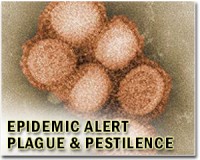| . |  |
. |
Seoul (AFP) Jan 1, 2011 Five wild ducks found dead in South Korea this week were confirmed Saturday to have been infected with a lethal strain of the bird flu virus as the country battles its first outbreak in over two years. Tests showed the five dead birds found in Sacheon City on December 26 had been stricken with the H5N1 virus, the agriculture ministry said in a statement. The same strain -- which poses a risk to humans -- has also been detected in wild birds and their faeces at four other locations across the country since December 7, it said. South Korea on Friday confirmed the outbreak of bird flu and more than 100,000 birds have been slaughtered as authorities seek to contain its spread. Two poultry farms, one in the central city of Cheonan and the other in the southwestern city of Iksan, were confirmed to have been contaminated, the ministry said. Health authorities placed a quarantine zone over a 10 kilometre (6.25 mile) radius, restricting movements of vehicles and people and carrying out emergency disinfection. They have also stepped up inspections of wild birds and urged poultry businesses to take extra precautions such as erecting nets around their farms to keep wild birds out. The avian influenza outbreak is likely to further strain the country's health system, which has already been struggling to contain swine flu and foot-and-mouth disease (FMD) cases across the country. South Korea has been hit by avian influenza three times, with the last outbreak in April 2008. In 2008, South Korea had to cull more than eight million birds to curb the virus, resulting in damages estimated at 200 billion won (194 million dollars at the time). Four people were confirmed to have been infected with the bird flu virus in late 2003 in South Korea but they showed few symptoms, health authorities said.
earlier related report Two poultry farms, one in the central city of Cheonan and the other in the southwestern city of Iksan, were confirmed to have been contaminated by the H5N1 virus, the agricultural ministry said. It marked the first time since April 2008 that the country has been hit by avian influenza, it said. "All the 10,700 ducks at the farm in Cheonan and 17,000 breeding chickens at the farm in Iksan have already been culled and buried, together with 92,000 chickens raised at nearby farms," the ministry said in a press statement. Both farms have been placed under quarantine, with movements of vehicles and people restricted. It comes after Seoul confirmed three cases of the virulent H5N1 bird flu strain from wild migratory birds that arrived in the country for the winter earlier in December. Health authorities have stepped up inspections of wild birds and urged poultry businesses to take extra precautions such as erecting nets around their farms to keep out wild birds. Yoo Man-Keun, a senior official in Cheonan City, said migrant birds were suspected of having transported the virus. "Migrant birds are coming down to farms as they are unable to find food at their natural haunts," Yoo told journalists. "We've put up scarecrows to scare them away, but all to no avail." South Korea has been hit by avian influenza three times, with the last outbreak in April 2008. In 2008, South Korea had to cull more than eight million birds to curb the virus, resulting in damages estimated at 200 billion won (194 million dollars at the time). In the country's 2003-2004 outbreak, 5.28 million birds were culled, while a 2006-2007 outbreak resulted in 2.8 million birds being destroyed. Four people were confirmed to have been infected with the bird flu virus in late 2003 in South Korea but they showed few symptoms, health authorities said. The avian influenza outbreak is likely to further strain the country's health system which has already been struggling to contain swine flu and foot-and-mouth disease (FMD) cases across the country. A South Korean man has died from swine flu, becoming the country's first reported human death from the virus this winter, health officials said Thursday. The 30-year-old man, who was taken to hospital after showing symptoms on Monday, died on Wednesday and tests showed he was infected with the A (H1N1) virus, the Korea Centers for Disease Control and Prevention said. As of Friday, a total of 72 FMD cases have been reported across the country since November 29, prompting the culling of more than 580,000 cloven-hoofed animals including cattle and pigs in the worst-ever such outbreak. The agriculture ministry has estimated losses due to the FMD outbreak at 400 billion won (355 million dollars).
Share This Article With Planet Earth
Related Links Epidemics on Earth - Bird Flu, HIV/AIDS, Ebola
 Simple trap could combat dengue fever
Simple trap could combat dengue feverNew Orleans (UPI) Dec 30, 2010 A simple trap resembling a trash can that lures pregnant mosquitoes could help stop the spread of dengue fever, U.S. researchers say. Scientists at Tulane University say the trap, a gallon-size bucket, is baited with a mixture of chemicals that convince female mosquitoes it is a perfect spot to lay eggs. Once they fly in, they find not a stagnant puddle, but insecticide, LiveScience.com ... read more |
|
| The content herein, unless otherwise known to be public domain, are Copyright 1995-2010 - SpaceDaily. AFP and UPI Wire Stories are copyright Agence France-Presse and United Press International. ESA Portal Reports are copyright European Space Agency. All NASA sourced material is public domain. Additional copyrights may apply in whole or part to other bona fide parties. Advertising does not imply endorsement,agreement or approval of any opinions, statements or information provided by SpaceDaily on any Web page published or hosted by SpaceDaily. Privacy Statement |